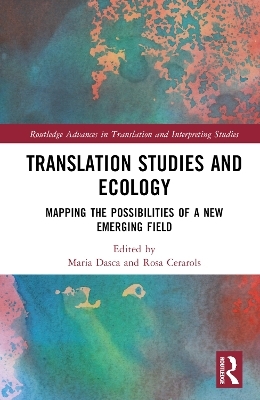
Translation Studies and Ecology
Routledge (Verlag)
978-1-032-29288-5 (ISBN)
This innovative collection explores the points of contact between translation practice and ecological culture by focusing on the relationship between ecology and translation.
The volume’s point of departure is the idea that translations, like all human activities, have a relational basis. Since they depend on places and communities to which they are addressed as well as on the cultural environment which made them possible, they should be understood as situated cultural practices, governed by a particular political ecology. Through the analysis of phenomena that relate translation and ecological culture (such as the development of ecofeminism; the translation of texts on nature; translation in postcolonial contexts; the role of dialect and minority languages in literary translation and institutional language policies and the translation of texts on migration) the book offers interpretive models that contribute to the development of eco-translation. Th volume showcases a comparative and interdisciplinary approach to an emerging disciplinary field which has gained prominence at the start of the 21st century, and places special emphasis on the perspective of gender and linguistic diversity across a wide range of languages.
This book will be of interest to students and scholars in translation studies, linguistics, communication, cultural studies, and environmental humanities.
Maria Dasca is Tenure-track Professor in the Department of Humanities at the Universitat Pompeu Fabra, Barcelona, Spain. Rosa Cerarols is Senior Lecturer in the Department of Humanities at the Universitat Pompeu Fabra, Barcelona, Spain.
List of Contributors
Preface
Part I: Language contact and postcolonialism
1. Gabriel Dols and Caterina Calafat, “‘Faut pas oublier que vous êtes sel’: Food and the political ecology of translation in/of Ken Saro-Wiwa’s Sozaboy”
2. Felicity Hand, “From head hunters to insurgents: Translating the cultures of India’s Northeast”
3. Edward Clay, “Language contact within an institutional ecosystem: The impact of EU translation”
Part II: Ecofeminism, migration and translation
4. Pilar Godayol, “Early ecofeminist debates of the seventies and eighties in Barcelona: Translations and reception”
5. Teresa Iribarren, “Displaced ecofeminisms: Between stigma, domestication and transformation potential. Considerations from translations into Catalan”
6. Manuela Palacios, “Translation, migration and gender: Some ecocritical and ecofeminist considerations”
Part III: Standard languages and linguistic variation
7. Helena Badell and Joan Josep Mussarra Roca, “Hymn to Demeter translated: Views on earth, land, and life”
8. Phrae Chittiphalangsri, “Antipodean translation: Reconfiguring the space and ecology of dialectal movement in Thai experimental literary translation”
Part IV: Ecotranslation and animal studies
9. Chengcheng You, “Re-engendering the genre: anthropomorphism in the eco-translation of Chinese wild animal stories”
10. Laura Vilardell, “Eco-translatology in the English Translation of Platero y yo, by Juan Ramón Jiménez, published by The Dolphin Book (1956)”
Index
| Erscheinungsdatum | 09.04.2024 |
|---|---|
| Reihe/Serie | Routledge Advances in Translation and Interpreting Studies |
| Zusatzinfo | 7 Tables, black and white; 2 Halftones, black and white; 2 Illustrations, black and white |
| Verlagsort | London |
| Sprache | englisch |
| Maße | 152 x 229 mm |
| Gewicht | 576 g |
| Themenwelt | Geisteswissenschaften ► Sprach- / Literaturwissenschaft ► Anglistik / Amerikanistik |
| Geisteswissenschaften ► Sprach- / Literaturwissenschaft ► Literaturwissenschaft | |
| Geisteswissenschaften ► Sprach- / Literaturwissenschaft ► Sprachwissenschaft | |
| Technik ► Umwelttechnik / Biotechnologie | |
| ISBN-10 | 1-032-29288-1 / 1032292881 |
| ISBN-13 | 978-1-032-29288-5 / 9781032292885 |
| Zustand | Neuware |
| Informationen gemäß Produktsicherheitsverordnung (GPSR) | |
| Haben Sie eine Frage zum Produkt? |
aus dem Bereich


